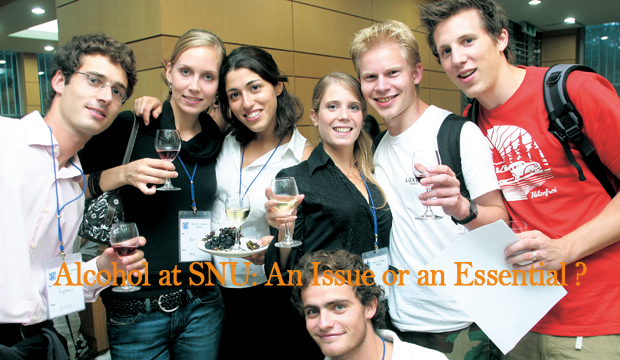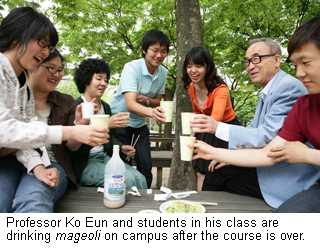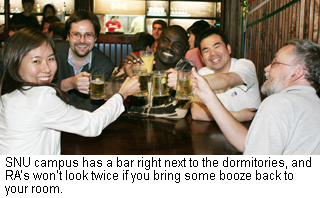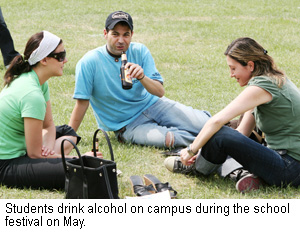
If you haven’t noticed already, it will become obvious to you soon enough: Koreans love to drink!
Walk around the streets near any college in Seoul and you’ll find hundreds of bars beckoning students with neon signs. Restaurants serve soju during lunchtime, with plenty of patrons inhaling bottles and bottles even on a typical weekday.
SNU’s campus has a bar conveniently located right next to the dormitories, and RA’s won’t look twice if you bring some booze back to your room. The drinking culture in Korea can be a shock to many foreigners.
Hubert, an exchange student from France, had this to say about Korean nightlife.
“It was definitely a surprise. I mean, people love to drink back home, but Koreans really love to drink! The drinking culture is definitely different from what I’m used to in France.”
Chris, a student from Switzerland, was quick to agree with Hubert. “It’s crazy, I’d go to some restaurant in the afternoon on like a Monday, and people would be drinking.”
The love of alcohol extends far beyond getting hammered at every opportunity, but on the surface this may be hard to realize. Yes, it does provide the occasional escape for stressed out students, and almost every major social event on campus come hand-in-hand with alcohol in some shape or form.  But alcohol is an important social lubricant in Korean society, especially for college students. Whether it may be celebrating the beginning of the year or the end of the semester (or even a Tuesday night with nothing else to do), Korean students use alcohol as a way to grow closer to one another.
But alcohol is an important social lubricant in Korean society, especially for college students. Whether it may be celebrating the beginning of the year or the end of the semester (or even a Tuesday night with nothing else to do), Korean students use alcohol as a way to grow closer to one another.
Ronald, a foreign student from San Francisco, recalls his time as a freshman attending his major’s “orientation” event.
“Basically, it’s a huge trip that everyone in the major takes together before classes start,” he says. “It was a lot of fun, but definitely a culture shock at first. We didn’t get much sleep at night because of the drinking games. A lot of kids didn’t have much experience with alcohol, so a few of them threw up. But it was still a good way to get to know your classmates for the first time.”
The infamous MT’s, which stands for “Membership Training”, are also similar to the “orientation” that Ronald was referring to. A large group of students from a certain club or major set aside time during the weekend to take a trip for the sake of promoting camaraderie and togetherness. If you haven’t figured it out by now, these two virtues come hand in hand with beer and soju. Drinking games are the main feature on these MTs, and it could be a long night if you’re terrible at them.
“Oh man, I think I ended up drinking five times as much as everyone else,” Hubert recalls. “I’ve never played these games before in France. It’s a lot of fun, but the games are confusing and take a lot of effort to follow sometimes. I hate thinking when I’m drinking!”
“Yeah it’s definitely different from the drinking games I played in the U.S.,” Ronald says. “You have to be good at memorizing Korean and thinking on the fly, so it was tough when you’ve had a few drinks.” The drinking games break the ice and help build memories together with your classmates. It can be a lot of fun, as long as you keep certain cultural rules in mind.
The drinking games break the ice and help build memories together with your classmates. It can be a lot of fun, as long as you keep certain cultural rules in mind.
In Korean culture, your age and year matters. Upper classmen are to be respected, and it is taboo for a younger student to egg on an elder to drink more. Although the upper classmen do have this right, most of them are more concerned with building camaraderie than getting you drunk out of your mind.
Also, because of the older brother/sister mentality, upper classmen are expected to cover the bill for all the outings during the first few months of a new school year. As a freshman, you can literally go for weeks without paying for a single meal or drink. Don’t feel guilty about letting the upper classmen take care of the bill, but remember that you are expected to do the same for future freshmen.
Alcohol is served on many other occasions. Bars are a common meeting ground for SNU clubs, and are much more convenient than heading off to an overnight excursion.
As a foreigner, understanding Korean etiquette in the bars is important. When serving alcohol, never pour your own drink. Wait for someone to serve you first, and then return the favor. When someone is pouring for you, hold up your glass with both hands. As far as tips to avoid heavy drinking if you’re not feeling up for it?
“Never empty your glass if you don’t want more to drink,” said Chris. “Keep your glass at least half-full, because someone’s going to fill it up. But you have to watch out, if you barely drink anything people will notice and make you do a shot with them!”
It’s easy to look at Korea’s drinking culture in a negative light. But the intended effects of alcohol are usually genuine at SNU. Clubs and majors love to see their members pull together and grow closer, and often this is done over a drink or two, or twelve. Ronald also points out that the presence of alcohol can help break down the code of conduct required by Korean culture. ``Alcohol helps younger students feel more comfortable talking to the upper classmen without worrying about showing the excessive respect that’s usually demanded in Korean culture,`` Ronald says. ``I was surprised at how quickly kids started to open up and speak their minds after they had a few drinks in them.``
``Alcohol helps younger students feel more comfortable talking to the upper classmen without worrying about showing the excessive respect that’s usually demanded in Korean culture,`` Ronald says. ``I was surprised at how quickly kids started to open up and speak their minds after they had a few drinks in them.``
So the next time when you’re heading back to the dorms and see a drunken student vomit all over the sidewalk, take it all in perspective. In a culture that stresses etiquette and politeness in conversation among new acquaintances, alcohol is a way to break down these barriers and encourage truthful and genuine conversation without the need to put up a front.
Although there are many negative stigmatisms associated with alcohol, Korean culture would not be the same without the friendships that are built through sharing a bottle of soju or a pitcher of beer.
June 24, 2006
By SNU English Editor, Michael Kang
SNU NOW
News
News
Alcohol: An Issue or an Essential?
Jun 24, 2008

